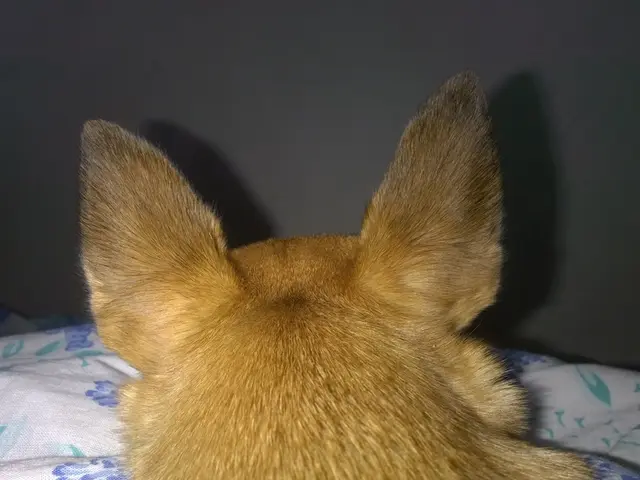Reasonings Behind a Dog's Paw Licking and Treatment Options Identified (9 Causes Discussed)
Excessive paw licking in dogs can be a sign of various underlying issues, making it essential for pet owners to be aware of the common causes and available treatments.
Common Causes of Paw Licking
Dogs may lick their paws due to a range of factors, including infections, injuries, allergies, parasites, skin conditions, behavioral issues, and hormonal imbalances.
Infections
Infections, such as bacterial and yeast infections, thrive in the warm, moist space between paw pads and cause itching, swelling, redness, and discomfort, prompting licking that can worsen the infection.
Allergies
Allergies, whether to environmental factors like grass pollens, tree pollens, house dust mites, or certain types of food, often cause itching, redness, and inflammation that lead dogs to lick their paws for relief.
Injuries or Foreign Bodies
Injuries or foreign bodies can cause pain that dogs try to relieve through licking.
Behavioral Causes
Behavioral causes include stress, anxiety, boredom, or compulsive disorders leading to obsessive licking that may cause sores and infections.
Skin Conditions
Skin conditions like dermatitis, mange (mites), ringworm, hot spots, and autoimmune disorders also provoke paw licking.
Treatments for Excessive Paw Licking
Treatments vary depending on the underlying cause but generally include:
Veterinary Diagnosis
A veterinary diagnosis is crucial to identify infections, allergies, parasites, or other issues (often with skin scrapings or lab tests).
Medical Treatments
Medical treatments such as antibiotics, antifungal medications, medicated shampoos, parasite prevention, or anti-inflammatory drugs for infections and dermatitis may be prescribed.
Addressing Allergies
Allergies can be managed through avoidance of triggers, dietary changes, or allergy medications.
Managing Behavioral Causes
Behavioral causes can be addressed with increased physical and mental stimulation, environmental enrichment, anxiety-relief strategies, or veterinary behavioral therapy.
Home Remedies
Home remedies for relief might include paw cleaning, soothing baths, and preventing licking with protective boots or collars. However, persistent or severe cases require veterinary care.
Importance of Early Treatment
Because excessive paw licking can cause complications like sores, infections, and paw fur staining, early veterinary evaluation and tailored treatment are important to ensure comfort and prevent worsening. If your dog is excessively licking its paws or shows signs of saliva staining in its fur, veterinary attention may be necessary.
- Excessive paw licking in dogs can be due to skin conditions like dermatitis, mange, ringworm, hot spots, and autoimmune disorders, urging pet owners to be aware of these potential causes.
- Injuries or foreign bodies can cause pain that dogs try to relieve through licking, highlighting the importance of checking for any potential injuries in the dog's paws.
- Allergies, food or environmental, can often cause itching, redness, and inflammation that lead dogs to lick their paws for relief; pet owners should monitor their pets' diet and surroundings for possible allergen triggers.
- Behavioral issues such as stress, anxiety, boredom, or compulsive disorders can lead to dogs licking their paws excessively; offering more physical and mental stimulation, environmental enrichment, or anxiety-relief strategies might help address these causes.
- Home care for excessive paw licking can include paw cleaning, soothing baths, and the use of protective boots or collars to prevent licking, but persistent or severe cases require veterinary attention to ensure proper care and prevent worsening health conditions.




